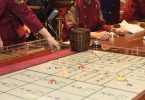Artificial Intelligence (AI) took a gigantic leap forward this week when AlphaGo – a program developed by Google-owned company DeepMind – defeated Go world champion Lee Sedol 4-1 in their best of five series.
Despite a late rally by Lee that saw him win the fourth game and very nearly the fifth, AlphaGo became the first computer program to ever beat a top-tier Go player with the dominant nature of the final result representing a major breakthrough for Artificial Intelligence as a whole.

An ancient Chinese board game dating back 3,000 years, Go is considered one of the world’s great mind sports. While it boasts a relatively simple set of rules in which players take turns placing black and white stones at various points on a grid in order to capture territory and claim their opponent’s stones, the number of moves available means there are almost limitless possibilities in how each game can play out.
In order to compete against a human player who had spent years learning Go’s nuances, AlphaGo needed to learn too and did so by playing millions of games against itself during development. By doing so, it was eventually able to look ahead to various ways in which the game might play out and pick the move most likely to succeed.

Ironically, many of AlphaGo’s moves left the world’s Go community in shock by challenging widely held beliefs on the correct way to play, however the program’s victory has much wider implications in how Artificial Intelligence might be used to improve other technologies in the future. The possibilities are as endless as the possible moves in a game of Go!

“As with all powerful technologies, they bring opportunities and challenges,” said DeepMind founder Demis Hassabis.
“We think of AI at DeepMind as a powerful tool – a tool to help human experts achieve more. We believe in open and collaborative research and we believe in the power of AI to benefit the many, not just the few.”







